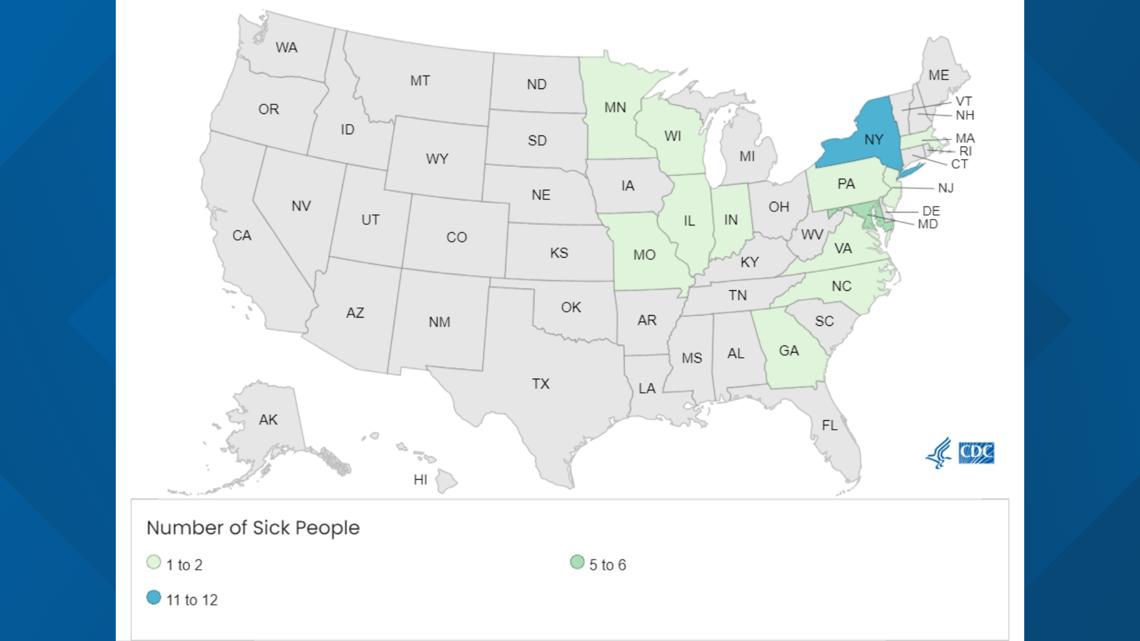WASHINGTON — One week after the initial recall of nine Boar’s Head Provisions products due to an outbreak of Listeria monocytogenes, the company has announced it is recalling 71 more products.
The recalls come after Listeria infections that were linked to sliced meats from delis appeared in multiple states. As of July 30, 34 sick people have been identified in 13 states, including eight cases across the DMV. Thirty-three of those people have been hospitalized, and two have died.
Boar’s Head initially only recalled liverwurst products, but the new recall includes meat intended for slicing at retail delis and some packaged meat and poultry products sold at retail locations. They were produced between May 10 and July 29 and are sold under both the Boar's Head and Old Country brand names. They have sell-by dates ranging from July 29 to Oct. 17.
Consumers who have bought any Boar’s Head or Old Country products should check the list below and throw away any that have been recalled. You can also view the labels of all of the products here.
The recall includes approximately 7 million additional pounds of products. The first recall included 207,528 pounds.
RELATED: Boar's Head Deli Meat listeria recall expanded to all products made out of Jarratt facility
What are Listeria?
According to the CDC, Listeriosis is a serious infection usually caused by eating food contaminated with the bacterium Listeria monocytogenes. An estimated 1,600 people get listeriosis each year, and about 260 die.
Listeria bacteria can be found in soil, water, and animal feces, according to the Mayo Clinic.
People can get infected by eating the following:
- Raw vegetables that have been contaminated from the soil or from contaminated manure used as fertilizer
- Contaminated meat
- Unpasteurized milk or foods made with unpasteurized milk
- Certain processed foods — such as soft cheeses, hot dogs and deli meats that have been contaminated after processing
The CDC says Listeria is the third leading cause of death from foodborne illness in the United States.
People who are pregnant and their newborns, adults 65 or older, and people with weakened immune systems are most at risk.


Symptoms
Most Listeria infections are so mild they can go unnoticed, according to the Mayo Clinic. However, they say in some cases, a Listeria infection can lead to life-threatening complications.
According to the CDC, symptoms of invasive illness usually start within two weeks after eating food contaminated with Listeria.
Invasive means that the bacteria has spread beyond the intestines.
People who are pregnant:
- Fever
- Flu-like symptoms, such as muscle aches and fatigue
- Symptoms in pregnant people are usually mild. Some pregnant people never have symptoms.
- However, infection during pregnancy usually leads to miscarriage, stillbirth, premature delivery, or life-threatening infection of the newborn.
People who are not pregnant:
- Fever
- Flu-like symptoms, such as muscle aches and fatigue
- Headache
- Stiff neck
- Confusion
- Loss of balance
- Seizures
- Symptoms in non-pregnant people can be severe.
- Almost 1 in 6 non-pregnant people with invasive listeriosis die.
Symptoms in newborns
- Little interest in feeding
- Irritability
- Fever
- Vomiting
- Difficulty breathing
How to prevent an infection
To prevent a Listeria infection, follow the Mayo Clinic recommendations:
- Keep things clean. Wash your hands thoroughly with warm, soapy water before and after handling or preparing food. After cooking, use hot, soapy water to wash the utensils, cutting boards, and other food preparation surfaces.
- Scrub raw vegetables. Clean raw vegetables with a scrub brush or vegetable brush under plenty of running water.
- Cook your food thoroughly. Use a food thermometer to make sure your meat, poultry and egg dishes are cooked to a safe temperature.
Anyone concerned about illness should contact a healthcare provider.

